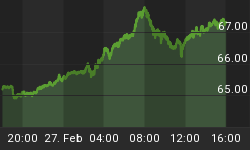Last week, the subcommittee which I chair held a hearing on monetary policy and rising prices. Whether we consider food, gasoline, or clothing, the cost of living is increasing significantly. True inflation is defined as an increase in the money supply. All other things being equal, an increase in the money supply leads to a rise in prices. Inflation's destructive effects have ruined societies from the Roman Empire to Weimar Germany to modern-day Zimbabwe.
Blame for the most recent round of price increases has been laid at the feet of the Federal Reserve's program of credit expansion for the past three years. The current program, known as QE2, sought to purchase a total of $900 billion in US Treasury debt over a period of 8 months. Roughly $110 billion of newly created money is flooding into commodity markets each month.
The price of cotton is up more than 170% over the past year, oil is up over 40%, and many categories of food staples are seeing double-digit price growth. This means that food, clothing, and gasoline will become increasingly expensive over the coming year. American families, many of whom already live paycheck to paycheck, increasingly will be forced by these rising prices into unwilling tradeoffs: purchasing ground beef rather than steak, drinking water rather than milk, and choosing canned vegetables over fresh in order to keep food on the table and pay the heating bill. Frugality can be a good thing, but only when it is by choice and not forced upon the citizenry by the Fed's ruinous monetary policy.
While the Fed takes credit for the increase in the stock markets, it claims no responsibility for the increases in food and commodity prices. Most economists fail to understand that inflation is at its root a monetary phenomenon. There may be other factors that contribute to price increases, such as famine, flooding, or global unrest, but those effects are transient. Consistently citing only these factors, while never acknowledging the effects of monetary policy, is a cop-out.
The unelected policymakers at the Fed are also the last to feel the effects of inflation. In fact, they benefit from it, as does the government as a whole. Those who receive this new money first, such as government employees, contractors, and bankers are able to use it before price increases occur, while those further down the totem pole suffer price increases before they see any wage increases. By continually reducing the purchasing power of the dollar, the Fed's monetary policy also punishes savings and thrift. After all, why save rapidly depreciating dollars?
Unfortunately, those policymakers who exercise the most power over the economy are also the least likely to understand the effects of their policies. Chairman Bernanke and other members of the Federal Open Market Committee were convinced in mid-2008 that the economy would rebound and continue to grow through 2009, even though it was clear to many observers that we were in the midst of a severe economic crisis. Even Greenspan was known for downplaying the importance of the growing housing bubble just as it was reaching its zenith. It remains impossible for even the brilliant minds at the Fed to achieve both the depth and breadth of knowledge necessary to enact central economic planning without eventually bringing the country to economic ruin. Our witnesses delved deeply into these issues and explained this phenomenon in very logical, simple terms. The American people increasingly understand what is going on with our money. I only hope the Fed is listening.















